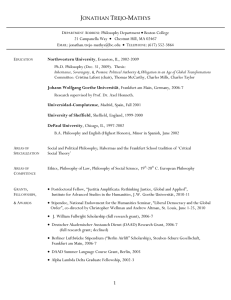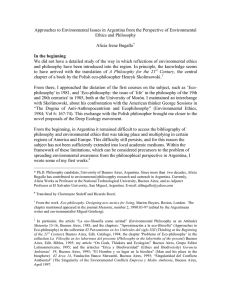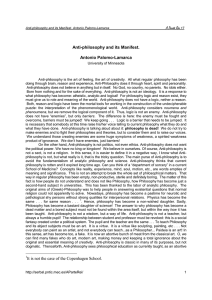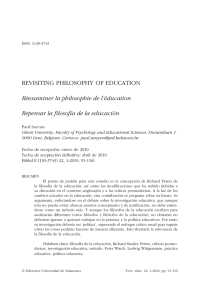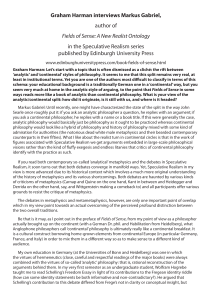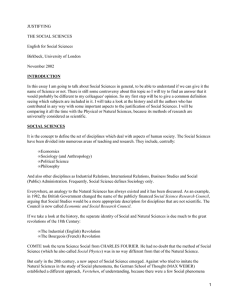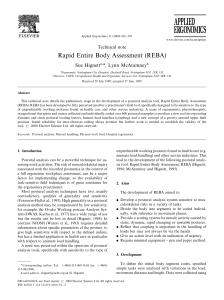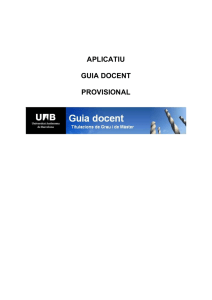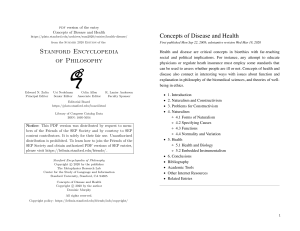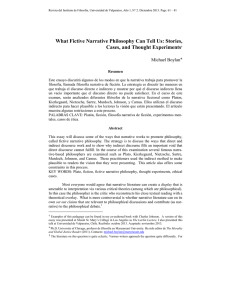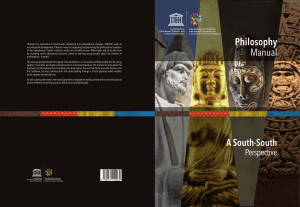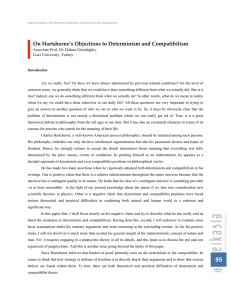Philosophy of Logic versus Philosophy of Education1
Anuncio
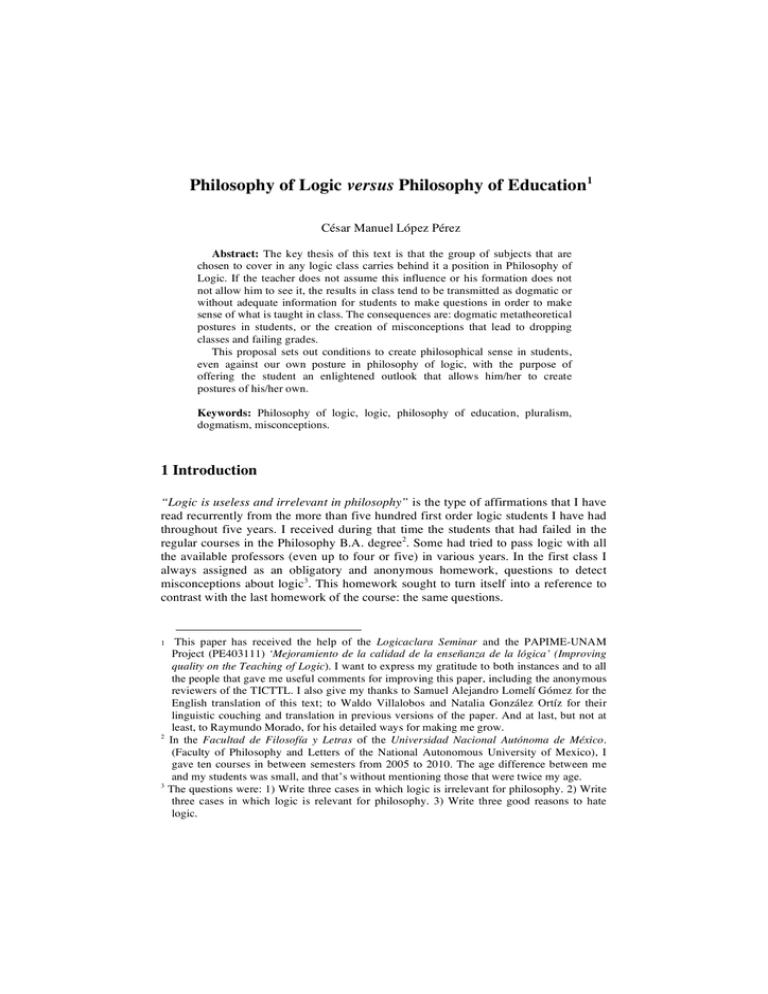
Philosophy of Logic versus Philosophy of Education1 César Manuel López Pérez Abstract: The key thesis of this text is that the group of subjects that are chosen to cover in any logic class carries behind it a position in Philosophy of Logic. If the teacher does not assume this influence or his formation does not not allow him to see it, the results in class tend to be transmitted as dogmatic or without adequate information for students to make questions in order to make sense of what is taught in class. The consequences are: dogmatic metatheoretical postures in students, or the creation of misconceptions that lead to dropping classes and failing grades. This proposal sets out conditions to create philosophical sense in students, even against our own posture in philosophy of logic, with the purpose of offering the student an enlightened outlook that allows him/her to create postures of his/her own. Keywords: Philosophy of logic, logic, philosophy of education, pluralism, dogmatism, misconceptions. 1 Introduction “Logic is useless and irrelevant in philosophy” is the type of affirmations that I have read recurrently from the more than five hundred first order logic students I have had throughout five years. I received during that time the students that had failed in the regular courses in the Philosophy B.A. degree2. Some had tried to pass logic with all the available professors (even up to four or five) in various years. In the first class I always assigned as an obligatory and anonymous homework, questions to detect misconceptions about logic3. This homework sought to turn itself into a reference to contrast with the last homework of the course: the same questions. This paper has received the help of the Logicaclara Seminar and the PAPIME-UNAM Project (PE403111) ‘Mejoramiento de la calidad de la enseñanza de la lógica’ (Improving quality on the Teaching of Logic). I want to express my gratitude to both instances and to all the people that gave me useful comments for improving this paper, including the anonymous reviewers of the TICTTL. I also give my thanks to Samuel Alejandro Lomelí Gómez for the English translation of this text; to Waldo Villalobos and Natalia González Ortíz for their linguistic couching and translation in previous versions of the paper. And at last, but not at least, to Raymundo Morado, for his detailed ways for making me grow. 2 In the Facultad de Filosofía y Letras of the Universidad Nacional Autónoma de México. (Faculty of Philosophy and Letters of the National Autonomous University of Mexico), I gave ten courses in between semesters from 2005 to 2010. The age difference between me and my students was small, and that’s without mentioning those that were twice my age. 3 The questions were: 1) Write three cases in which logic is irrelevant for philosophy. 2) Write three cases in which logic is relevant for philosophy. 3) Write three good reasons to hate logic. 1 My interest in designing the first homework was to document the misconceptions against logic that can be found in hallway chats. My interest in the last homework was to be sure that such misconceptions were eliminated throughout the course. In all of the three hundred students that reached the end of the courses I gave, and obtained a passing grade, we find informed answers regarding the relevance and irrelevance of logic in philosophy. When it came to their reasons to reject logic, we found reflections in which they labeled, of their own accord, the distinction between the responsibilities a teacher had and the ones they as students had as a way to better comprehend the rejection they once had towards logic. The course managed to eradicate the initial misconceptions in most of the graduating students4. The removing of the rejection is a wider subject than what the present text deals with and requires talking about many more strategies and didactic tools in order to be covered. In this text I will explain the several hypothesis and assumptions that allowed me to eliminate misconceptions towards logic. It is important to consider the context in which they were elaborated, the type of problems that gave origin to the elaboration of those hypothesis and their metatheoretical consequences. 2 Context In the years UNAM hired me to teach remedial courses; there were a considerable number of students stuck in the process of obtaining their B.A. degree, due to failing logic courses. These observations made me conjure up the hypothesis that there were certain questions that philosophy students were not properly answering in their logic classes. “A lack of sense”, was what various doctors in philosophy specialized in areas apart from logic have called it. When I talked privately to them about the situation, they accepted to have passed logic in the B.A. studies “in an artificial way”, “without understanding” and due to that, they were kept unable to consider engage in a fruitful dialogue with the common problems their different area of specialization shared with logic. Among their logic teachers and those who gave at that moment regular courses, we could find, since several years ago, some impeccable logicians: professors who gave correct explanations and exercises without errors. Curiously, among the students that came to my course full of misconceptions, there were ex-students of those good logicians too. Of course there were also misconceptions on favor of logic. Maybe the direst case of a prejudiced student was that one located in the opposite end of the spectrum. He 4 In these remedial courses we covered propositional and quantificational logic (and some times, logical analysis of arguments), in four weeks. In 2007, Fernando Flores Galicia had the idea of creating the “Logicaclara” Seminar for past students of this course. Since then it has continued under our joint coordination. In the seminar I went more in depth in my reflections and collectively elaborated strategies, materials and classes. The seminar took a turn towards training new professors and currently does research in the didactics of logic, produces multimedia studying aids and gives training for the International Logic Olympics. That collective work was an incentive to this paper. assisted as auditor since he had passed the logic courses already. He held the belief that [classic propositional] logic was the criteria of rationality, epistemological evaluation, ethics, politics and determinant of what is accepted as philosophy and what not. His passion for logic had something deeply in common with those students that hated it: they were misconceptions. As I examined more the anonymous homeworks, I classified the misconceptions. Answers of this type could be found: (i) “Logic is irrelevant for philosophical work, given that there are multiple examples of adequate philosophical argumentation that are made without using logic.” (ii) “Logic is irrelevant in philosophy because it seeks to cover everything without successfully doing so”. (iii) “Logic is relevant in philosophy because without logic there can be no true philosophy.” This type of misconceptions has the characteristic of being present in students along with technical explanations and correct theories. If misconceptions are erroneous beliefs, judgments that have been made before adequate information arrives, what information is lacking in students with misconceptions (i), (ii) and (iii), given that some of them received good explanations in previous courses? 3 A lack of sense The concept of “sense” carries with it some of the concept of “direction”. We can be more specific in order to transform this colloquial metaphor into a useful way to impact this lack or presence of sense. The point is to conceive the “sense things have” as something we create. It is not something things have by themselves. It’s about attributions we make when we find at least one of two connections: (a) an end (or objective) in the task, whether it is told to us or supposed by us; (b) meaningful information, that is, a connection with previous knowledge, cultural backgrounds, or personal interests. The good theoretical and technical explanations in regular courses, from where my students came from, answered the following questions “What is it?” and “How is it used?” The exercises sought to develop the mastery of use. The examples were so trivial that they kept the abstractions disconnected from the student’s previous knowledge. The question that students did not find an answer to in their logic courses was: “What is it useful for?” That is a root of many misconceptions. When there is not sufficient information to come up with an answer to that question, the answer is nevertheless made up with whatever is available. Misconceptions are created sense that comes from a lack of adequate information. When students do not comprehend nor have meaningful examples of use available to them, the sense they create about the usefulness of logic is justifiably poor. Seeing throughout a course only trivial examples such as: “Every man is mortal, Socrates is a man. Therefore Socrates is mortal.” or “If Colgate wins the game, Ahmerst loses it. Colgate won the game. Therefore, Ahmerst lost it.” students come to reasonably affirm that logic does not have a philosophical use. These examples may be correct from a logical point of view, and the explanations flawless. However, there’s a lack of evidence of its philosophical use. From facing only trivial uses in class students end up believing that logic has only trivial uses. 4 Guidance towards philosophical sense The misconceptions we’ve previously referred to, have two type of consequences: 1) Students that pass the course and end up losing contact with logic in their professional life or, worse yet, defend a dogmatic –and mistaken- idea about what sort of things logic is for. And this is so whether they end up hating the discipline or appreciating it. 2) Students that fail or drop out of logic courses, and in extreme cases abandon their degree. There are several ways to guide the intellectual process of creating sense about a discipline as abstract as logic. The teacher’s responsibility in this guidance comes up when the student lacks the adequate information to pose questions in class that would grant him a correct outlook. Often the student does not distinguish correct judgments from misconceptions. If the teacher does not engage in a way to change this, the student tends to reinforce his misconceptions, organizing the new information he receives in a skewed manner. It is not enough to reject our students’ misconceptions in class. We ought rather to answer the quest for sense that caused them. A way to philosophically guide the creating of sense in logic subjects is to turn the question “What is it for?” into three more specific ones: 1) Finality of the subject or “For what objective is it used?” 2) Reach of its application o “In which cases is this used?” 3) Limits of its application or “In which cases this can not be used?” We’ll call these three questions guiding questions. The examples used previously regarding trivial exercises and the appearance of the –reasonable- prejudice about the “lack of philosophical use of logic” could be dissolved with the creative and didactic work of selecting or developing non-trivial examples that can be applied to the degree in which they are being taught. However, the type of misconceptions as those pointed out in section two (i, ii and iii) go beyond the didactic tasks we can carry out. A flawless course on propositional logic, again, with technical explanations and correct theories –even successfully didactic- could make those misconceptions come up as well. In all three cases, it’s about beliefs created on mistaken appreciations and information about the end purpose, reaches and limit of this discipline. The answer to this type of questions implies philosophical positions. Any attempt at an answering this will imply a philosophical posture from which it is worked on. Is logic only the deductive one, which evaluates logic validity and deviant nondeductive logics are not logics strictly speaking? Or, is logic the study of inferences whether it is deductive, inductive, abductive or whatever type it is? 5 Philosophy of logic, underlying our explanations The cases of non-trivial examples are one way to guide the sense that our students create. Offering examples that show relevant uses of logic answers to the second guiding question: In which cases is it used? For the cases of those misconceptions pointed out in i, ii and iii, it’s not enough to offer non-trivial examples; the students remain without sufficient information to answer the first and third guiding questions (purpose of the subject and limits of its application). The means that makes such misconceptions come up or can make them dissolve guiding the creation of sense, is in the selection of topics and subtopics in which we explain our logic classes. We could try giving a direct answer to the guiding questions. But, would that be from our own metatheoretical posture? For example: When we explain the topic of logic and the varying types of inference. If our posture in philosophy of logic considers the non-deductive types of inference under the disciplinary area of logic, will we teach so to our students? And when we consider that the non-deductive inference types belong to the field of study of logic, is that what we will explain? Two different professors will guide in a different way their students’ sense. The main thesis of this text is that behind our choice of which topics to explain in a logic class, there’s implicitly a posture in philosophy of logic. Even if we make a random selection, there’s a metatheoretical posture (as manner of function) that belongs to this choice of topics. This implicit posture guides in an informed or dogmatic way the creation of sense among our students. When we give an elementary logic class, first order logic or any course for those starting the study of our field, we do not cover the clarification of postures as we would in an advanced course of philosophy of logic. We can reasonably consider that the philosophical reflection of logic can wait for an advanced course, while the students acquire a minimal comprehension of the topics they will reflect upon. However, this does not deny the fact that while students learn the basic topics, they create sense and the result of that sense is what will become their own metatheoretical postures. If they turn out to be prejudiced by a lack of information, they will not reach the advanced courses. And if we answer to the guiding questions directly, we will guide this creation of sense in a dogmatic way. 6 Philosophy of Education versus Philosophy of Logic We have then, two alternatives: (A) Not assuming we guide the creation of sense and the metatheoretical postures of our students. (A.1) This leads to denying the responsibility about the guidance of sense in our students. The result is that misconceptions come up among students. (A.2) Not assuming can result in the dogmatic transmission of metatheoretical postures. When a logic professor’s preparation is deficient enough for him not to notice, the transmission of said posture tends to come hereditarily from his own logic professor years back. The end result is a chain of dogmatic metatheoretical postures being passed on and on. (B) Assuming that we do guide the creation of sense and the metatheoretical postures of our students. But, towards which posture do we guide towards? Ours? Given that there are different metatheoretical postures about many of the topics that make a logic course, what would the problem be in assuming the transmission of the posture in philosophy of logic we consider the best? If we consider logic as something that only studies deductive inference, why not guide both the sense and metatheoretical postures of our students towards that way of thinking? The answer to the question of content “Towards where do we guide?” is faced with the question “How do we guide?” Not accepting dogmatism in assumed or not assumed guidance is in itself a philosophical guidance, also one of sense in philosophy of education. And so is rejecting the creation of misconceptions. The guidance of philosophical sense (in philosophy of education) focuses on the way in which we educate by considering the type of human being that result from that way. There can be guidance of sense (and consequently metatheoretical guidance) that are not philosophical. There is no problem with this, as long as we also choose the type of human being that result from that way of guiding. In the context of teaching logic to philosophers, a dogmatic instruction is unacceptable. Opting for a guidance of philosophical sense, from a perspective in philosophy of education, leads to a potential confrontation with the posture we hold in philosophy of logic. If not transmitting our personal posture in philosophy of logic helps to avoid dogma and prejudice, are we willing to not teach it? Can philosophy of education be over philosophy of language? How can we accomplish this, even if while we try to avoid transmitting explicitly, it is transmitted in our selection of contents? It’s not the case that there is a problem with some metatheoretical positions in philosophy of logic, but rather with them being passed on in a dogmatic way. It is so that if we as logicians consider that a change in logic is a change in subject [3], or that a deviant system [4] implies it is a rival system [5], and it happens that our students create sense towards these postures, the (educative) problem rests on if they created this posture in a dogmatic way or not. 7 Conciliation: Selection of topics in the syllabus and Pluralism Avoiding dogmatism and misconceptions is accomplished by offering students the sufficient information about each topic so that they themselves form their own posture in philosophy of logic. Even if this posture results different from the one we hold. If we manage that students create their own philosophical posture in philosophy of logic, and that posture matches with ours, then we are guiding philosophically. If they dogmatically follow the position we present them, or acquire it without noticing it throughout the selection of topics of our course, we have not guided philosophically. The result appears to be the same in regards to the student’s metatheoretical postures. But it is very different in an educative sense. The human being that aims for this philosophical guidance of sense is that one that possesses the faculties for critical thinking 5, is enlightened6 and –consequently- one open to dialogue with disciplines and schools different from his own. A human being without misconceptions. With this criterion to accept the teaching of topics with the metatheoretical posture that best fits the creation of our student’s own postures, even if it is different from the one we hold, we can talk about pluralism. Pluralism is a posture about postures and we can assume it due to methodological reasons for the selection of topics and subtopics that will be the medium to implicitly guide the creation of sense and selfchosen postures among students. Let’s remember that in the pluralist views there’s one that proposes: “[...] let us emphasize on the possibilities of an alliance between various logics, especially because the contrary is what’s usually emphasized. I believe that the work plan that comes that way is more fruitful by focusing on rivalry only as possibility of cooperation. And even when a logic is wrong in its critiques to CL (Classical Logics), for example, relevant logic, it is convenient to look for areas in which its application can be worth it.”(The translation is mine) [5] Each subject we give in class, as a strategy, ought to be grouped in subtopics and adjoining topics. Subtopics are those that are exposed under the explanation of another subject. Some topics become subtopics of another one when in another moment their roles can switch 7. Adjoining topics are those that do not belong to the system or logic we are explaining, but are included to show a contrast or alternative in the different ways to think about a specific issue. They could also be historic or transdisciplinary references. The selection and organization of subtopics, allows showing relationships between aspects of the system that is being covered. This way we manage to introduce the pertinence of specific questions, for example: In classic propositional logic. Topic: validity demonstrations by the syntactic method of natural deduction. Subtopic: validity proof by the associated conditional truth table semantic method. This choice of a subtopic favors questions about metalogical properties such as completeness and soundness to arise, instead of directly introducing those notions as a topic that does not have sense yet. The selection and organization of adjoining topics places subjects with reference towards the limits of their application and through that, the question of the cases in which such subject is used. Example: With bivalance in classic propositional logic as topic, including an explanation of trivalence of the system of Jan Łukasiewicz and his motivations as adjoining topic. This offers perspective about the limits of application of bivalence. The creation of philosophical sense remains guided. We show the 5 By possessing the faculties for critical thinking, I understand that one that does not accept affirmations or beliefs without reasons, that is, one who rejects dogma. 6 I understand enlightened in the Kantian sense: that one that finds himself freed from his “selfincurred incapacity” [2]. One that creates his own metatheoretical postures. 7 Let’s put as example the subject of Truth values for a propositional logic course. A subtopic is bivalence, another is truth functions. A different subject that may become a subtopic if mentioned under the explanation of truth values could be the definition of connectives. It would be a subtopic momentarily, even though later, in another session, it will become the main topic. pertinence of making questions about limits, even without mentioning them. We opened the possibility of planning questions about tetravalence and the criteria to include even more truth values. Sometimes, adjoining topics only show consideration to different assumptions in a topic; sometimes we have to avoid an adjoining topic when the assumptions that it requires are of a more complex theoretical or technical solvency for the students than the one they currently possess. What we make explicit, in case our personal posture is different from pluralism, is that even though there have been different postures in the history of logic about the topic, the debate goes on. In this frame we can make explicit our personal posture and invite students to reflect on their own. The bias has been changed for an honest invitation to our students to choose for themselves, “freeing themselves from their self-incurred incapacity.” The best invitation to assume an enlightened perspective is giving enough information to make it possible, to philosophically guide the creation of sense in each topic in our course. References 1. 2. 3. 4. 5. 6. Irving M. Copi, Symbolic Logic, New York: MacMillan Publishing Co., Inc., (1979) Kant, Immanuel, “¿Qué es la Ilustración?”, Filosofía de la Historia, Fondo de Cultura Económica, México. Quine, W. V., Philosophy of logic, Harvard University Press, Cambridge, Massachusets. (1970) Haack, S., Deviant Logic, Cambridge University Press, Cambridge. (1974) Morado, R., "La rivalidad en Lógica", Dianoia, año XXX, No. 30, pp. 237-249 (1984) Haack, S., Philosophy of logics, Cambridge University Press, Cambridge. (1978)
